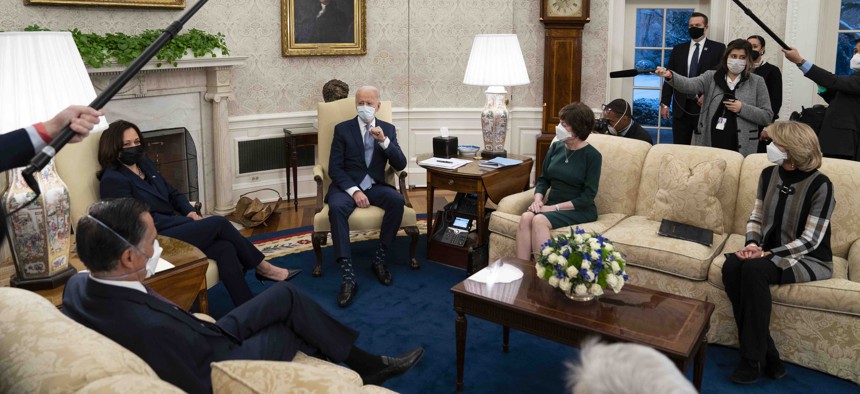Republicans Leave Direct State and Local Aid Out of Scaled-Down Covid Relief Pitch to Biden

President Joe Biden meets Republican lawmakers to discuss a coronavirus relief package, in the Oval Office of the White House, Monday, Feb. 1, 2021, in Washington. AP Photo/Evan Vucci
President Biden met Monday evening with 10 GOP lawmakers backing the $618 billion proposal.
A group of 10 Senate Republicans made their case to President Biden on Monday night for a bipartisan coronavirus relief package, outlining a roughly $618 billion plan that would not include direct aid to state and local governments.
Republicans released details of their proposal, which is far smaller than Biden’s own $1.9 trillion plan, earlier in the day. Sen. Susan Collins, who led the Republican delegation, called the meeting with Biden “very productive” and said lawmakers had “a good exchange of ideas” with the president, vice president and members of their staff.
"I wouldn't say that we came together on a package tonight—no one expected that in a two hour meeting," said Collins, of Maine, adding that further discussion about the two proposals is expected to continue.
“I am hopeful we can once again pass a sixth bipartisan covid relief package,” she said.
Ahead of Monday’s meeting, White House Press Secretary Jen Psaki declined to say whether removal of state and local aid from the GOP proposal was a nonstarter for Biden. She reiterated that Biden believes his proposal would address the broader issues affecting Americans, adding “the size of the package needs to be commensurate with the size of the crisis we are facing.”
“Clearly he thinks the package size needs to be closer to what he proposed than smaller,” Psaki said.
While the much smaller Republican proposal is unlikely to draw broad support from Democrats, it will test Biden’s calls for unity and bipartisan collaboration in Washington. Democrats now hold control of the White House and a narrow majority in Congress and could seek to fast-track approval of his proposal without Republican support.
The Republican framework scales down some aspects of Biden’s plan, such as direct payments to individuals. It would provide payments of $1,000 to individuals who make less than $40,000 a year, rather than $1,400 to those who make $75,000 or less. The proposal includes funding to pay for supplemental $300-a-week unemployment benefits through June, compared to Biden’s which would provide funding for $400-a-week payments.
But it preserves other aspects of the Biden plan, including $160 billion to bolster Covid-19 response through vaccine disbursement and increased testing capacity. The GOP proposal would also provide $40 billion for the Paycheck Protection Program, which helps small businesses cover payrolls, and $12 billion for nutrition programs such as food stamps.
Biden’s agreement to meet with the 10 Republican senators comes after lawmakers wrote to him over the weekend asking to discuss their plan.
“In the spirit of bipartisanship and unity, we have developed a Covid-19 relief framework that builds on prior covid assistance laws, all of which passed with bipartisan support,” the lawmakers wrote. “Our proposal reflects many of your stated priorities, and with your support, we believe that this plan could be approved quickly by Congress with bipartisan support.”
Psaki issued a statement after Monday’s meeting saying that while the president is hopeful a relief package will garner bipartisan support, he "will not slow down work on this urgent crisis response, and will not settle for a package that fails to meet the moment."
The slimmer Republican proposal was introduced on the same day the nonpartisan Congressional Budget Office released projections indicating the U.S. economy may be on track to recover more quickly than previously expected. The CBO report forecasts that the national unemployment rate will fall to 5.3% in mid-2021 and then decline to 4% between 2024 and 2025.
Andrea Noble is a staff correspondent with Route Fifty.
NEXT STORY: Biden’s Pause on Oil Leases Could Squeeze State Budgets





